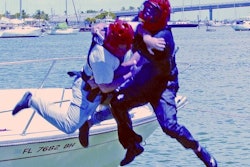"The important thing to recognize is that it takes a team, and the team ought to get credit for the wins and the losses." - Philip Caldwell
Leadership is too often thought of as an individual sport. Sometimes I think that people view leadership like golf. If you play a lot, take classes, and study the art of golf, you will be a good golfer. I always hear, "He (or she) is a good leader," as if it were an individual success. I think of leadership as really being more of a team sport. Like football, you have to learn, practice, and play individual positions with individual skills, but you cannot be successful unless the team is working together.
For example, a quarterback can be a leader and a great passer. But if the receivers don't follow the plays and they drop the ball, what credit does he gain as an individual? Still, I have rarely heard anybody describing a group collectively as good leaders; usually people are pointed out individually as to their leadership skills, good or bad.
This is interesting, since in my most successful positions I never led alone. And I was never truly successful unless I engaged all the subordinate leaders within my organization and demanded that they work together and help each other out. It is essential in the supervisory ranks that leadership be considered a team sport.
From a practical perspective, not even the best leaders can work 24 hours a day, seven days a week. So who is taking care of the leadership issues with their subordinates when they are not there? Take a second to think about the most successful leaders that you have known. What was their supporting cast of leaders like? I bet you dollars to doughnuts (no cop jokes, please) that their subordinate leaders were not only good individual leaders, but worked well together.
In last month's column, "Leading Cops and Two-year-Olds," I talked about how some officers try to play the lieutenant against the sergeants. If they do not get the answer they want from one supervisor, they go ask a different supervisor. I don't necessarily hold it against them; it is human nature to use that type of tactic to get what you want. In the world of leadership, however, it is a test of the supervisors as to whether they communicate or coordinate properly and effectively enough. If your officers get away with that kind of behavior, then shame on you.
One example of when team leadership is especially important is in the case of a "problem officer." Because of schedule changes, days off, swing shift, or whatever schedule an organization works, if you are a supervisor trying to change one officer's behavior, it is impossible for you to do it alone. Let's say the officer has low productivity. He only writes the occasional ticket, never picks up radio calls, and has the fewest arrests on the watch. Generally, this officer just drives around for the whole shift doing little to nothing.
The classic leadership question is, "What do you do now, Lieutenant/Sergeant?" The first thing I would do is meet with the other supervisors and confirm there is a problem. Maybe I do not have institutional knowledge of this individual. Was he a productive officer at some point? What does his record look like? If so, why has that changed? In my mind, there has to be some agreement that there is a problem that either needs observation or action.
A plan of action to improve the officer's productivity should be agreed upon. The officer's most direct supervisor should be made aware of the problem and assigned to monitor the situation. That entails any required counseling, written progress reports, retraining, or disciplinary action. The remaining supervisors need to be aware of the issue so that they can monitor the individual when appropriate: in the field; in training; and in court. These actions require persistence and patience. The senior leader has to keep the other supervisors focused until the problem is resolved.
This is the kind of positive pressure that can only be brought about by team leadership. While individual supervisors can bring their individual leadership skills to bear on aspects of a problem, only through effective team leadership can long lasting change occur. It is important to remember that as a leader you are not alone. We all need the support and assistance of our fellow leaders to be truly successful in taking care of our people and completing the mission.

















